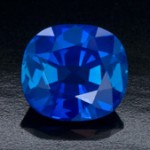
Sapphire
Share
Blue sapphire belongs to the mineral species corundum. It can be a pure blue but ranges from greenish blue to violetish blue. The name “sapphire” can also apply to any corundum that’s not red and doesn’t qualify as ruby, another corundum variety. (http://www.gia.edu/sapphire)
There are not just blue and red sapphires. Sapphires can come in colors of violet, green, yellow, orange, pink, purple and intermediate hues. These sapphires are called the “fancy sapphires”. It can, also be parti-colored sapphires that shows a combination of different colors. Sapphires can change its colors according to the light of day or incandescent light. They can even be a gray, black, or brown color.
It’s hard to find fancy sapphires in a jewelry store. They are less available than the blue ones. Some of the colors are scarce in small and large sizes. Most jewelry stores only has the traditional colors.
Sapphires are made from the mineral corundum, which is composed only of aluminum and oxygen. It requires an environment that’s free of silicon to grow. The mineral can be colorless. Colorless corundum are rare and it contains color-causing trace elements, which determines how much of the color will develop. The iron is about a few hundredths of a percent that causes the color. The more iron the mineral has the darker blue the sapphire’s color.
During the 1990’s, in East Africa and Madagascar gave a whole knew concept for fancy sapphires. It become so popular the new sources went from the traditional colors to increasing the availability of yellows, oranges, pinks, and purples.
This caused the jewelry designers who wanted change to move from traditional hues of red, blue, and green to the fancy sapphires. The contemporary designers arrange them in stunning rainbow suites.
Few people outside the gem industry realize the true nature of a gemstone’s journey from the mine to the counter of a store. Whether the gem is being offered to consumer’s at a traditional jewelry store’s counter, an internet shopping site, or a television broadcast the journey always involves a great deal of effort. Tons of earth and countless hours of labor are needed to being a gem from mine to market. (http://www.gia.edu/sapphire)

3.08 ct. blue Kashmir sapphire. Unheated, cushion, antique mixed cut.
In some traditions, sapphires symbolize nobility, truth, sincerity, and faithfulness. Also, royalty and clergy members for centuries would wear sapphires on their robes to symbolize Heaven. The ordinary folks thought the gem attracts heavenly blessings. As with any tradition it has been passed down by generations.
During other times in history people would instilled sapphires as the power to guard chastity, make peace between enemies, influence spirits, and reveal the secrets of oracles. Everyone has his or her own religion of what a sapphire symbolize. Handed down by generation to generation most people believe in mythical things or different culture religions.
In folklore, history, art, and consumer awareness, sapphire has always been associated with the color blue. Its name comes from the Greek word sappheiros, which probably referred to lapis lazuli. Most jewelry customers think all sapphires are blue, and when gem and jewelry professionals use the word “sapphire” alone, they normally mean “blue sapphire.”(http://www.gia.edu/sapphire)
As for the month of September the birthstone is the Sapphire. It is the gem for the 5th and 45th Wedding Anniversaries.






